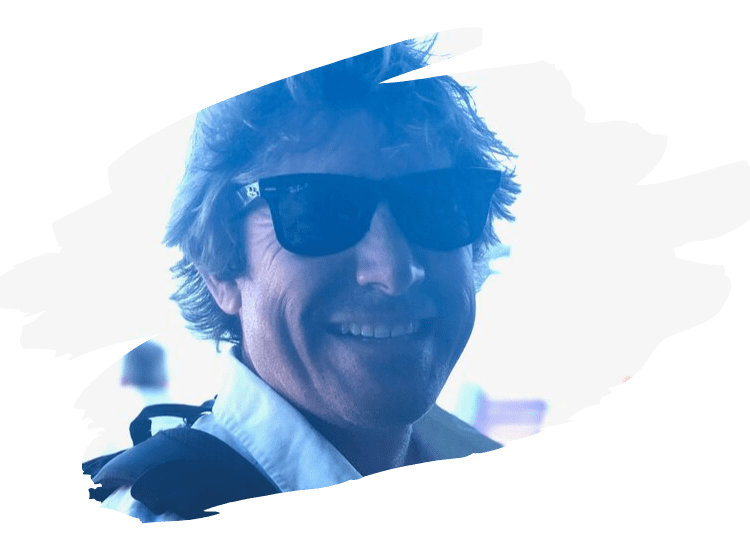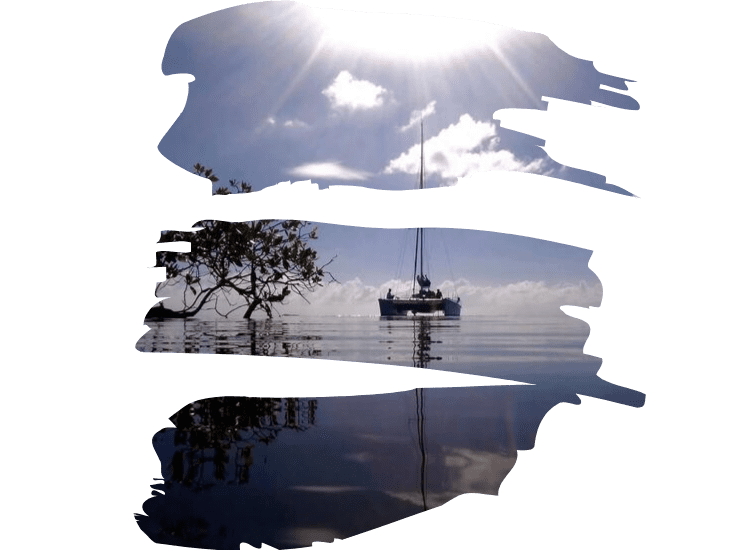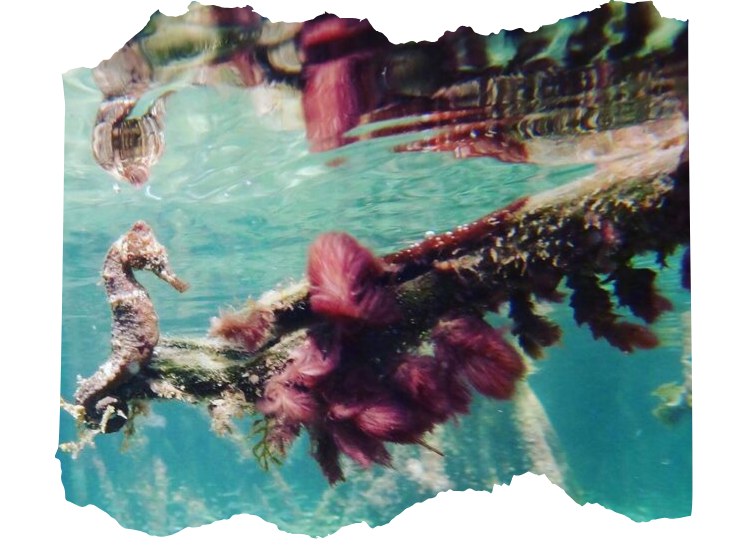
Day Tripper
Jeff Scott, husband and father of three, from Jefferson City, Missouri, found a way to make his passion for sailing both a life and a business in the small village of Placencia in the south of Belize.
“I don’t know if I can explain my favorite thing about sailing. The wind. The water. How, for one moment everything is perfectly dialed in and there’s nothing that you need to do different”, he says.
Jeff grew up with small boats on the midwest lakes and recounts how he and his friends would always say “One day, we’re gonna put a boat on the river and go all the way to the Gulf.” He and his wife Teresa had traveled by van around Central America when they were in their early twenties. With the idea that they could sail there one day instead, they sold their home and purchased their McCurdy and Rhodes 27’ sailboat and spent the summer on a nearby lake learning to live on it.
“I didn’t have any sea experience but I joined the coast guard auxiliary specifically to do this because then you can take coast guard navigation classes for free.” Married for two years and with a two year old son and three month old daughter aboard, they set off on their adventure. “Everyone asked where we were going, how long we were going for and we would respond ‘we don’t know for how long or where we’ll end up’.”


The boat was small and without a head (bathroom), they used a bucket. “There are many times that Theresa could have left me over the years and that’s one of them.” he laughs, “It was fun, it was stressful and it was hard, but we wanted to do it. We just wanted to go.”
They ended up getting a bigger boat in Florida for $17,000 USD and put $20,000 USD into fixing it up, which Jeff did himself. At the age of 32, with a third child now aboard, they sailed all the way down, through Mexico, to Belize. “We got to Belize and were like ‘Yes, thank you’”, Jeff says, “the Mexican coast is super rough, there is a north setting current that’s 2-4 knots. Wind is mostly north east that builds up these steep horrible waves. That’s the great thing about Belize, the barrier reef. It has all this protected water, even if its blowing.”
“I liked the boaters and local fishermen”, he recalls, “and they liked us because we sailed here. I really wanted to stay because I loved the area and I wanted to explore it. It was the small things that got me. Not wearing shoes, buying a drink from a bar to go, parking anywhere you want and never being in a hurry.”
They stamped into Belize in 2005 and Jeff started his period of one year without leaving the country in order to establish residency. They moved into a home and started going out day sailing for fun again.
“We were going to open a kosher falafel and pizza restaurant. Kosher has the same dietary requirements as rastafarians and backpackers and people think ‘clean and safe’ when they see kosher. We were looking for property to start this restaurant when a local tour operator offered me a job taking people sailing. They got me a work permit and got the boat registered commercially for me.”
Eventually, he sold the boat they’d sailed in on and bought a catamaran, named Lil, and he was booked every single day, taking up to 8 people at a time. “There was another local guy doing a Rasta Sail and he was charging $66/day. I thought it was really funny to charge $65/day.”
“We still do it exactly the same way as we did back then. If I take Teresa and our friends out, everyone comes to our house for around 10 and then we ask ‘where would be a good place to go today?’ and we go there . Then we get in the water, we eat and drink and that’s basically the exact same thing we do with our guests.”
Now known as Daytripper Catamaran, Jeff’s day sails now cost $75/person and include lunch and all the rum punch you can drink. “I tell our guests that ‘Daytripper is mostly a sailing trip but we’re going to go snorkelling. You’re going to see nice healthy coral and really nice fish because we don’t go to the places that everyone goes. We stay closer to shore and go to mostly mangrove cayes which is great for people who have done a lot of reef stuff.’”
“I don’t know if I can explain my favorite thing about sailing. The wind. The water. How, for one moment everything is perfectly dialed in and there’s nothing that you need to do different”

“We get a lot of people that go out at the start of their trip and they end up wanting to go out again before they leave because the price is so much more reasonable than other tour operators”, he says
After doing well enough that he was able to add a second catamaran to his fleet, he now operates two boats with very little overhead. ‘I pay my guys every single day. I go to the grocery store every morning for the rum punch fixings and I pay for the lunch. Maintenance is ongoing, of course, but not crazy.”
“The best thing about two boats is you always have one working.” He has a local Captain, named Andre, who works with him and who is like a partner now. “When I go to the states for North American summer, he runs Lil down here and he does everything like I would.”
“A lot of North Americans think that just because labor is cheap that the quality of labor is lower. I think you have to treat people with a lot of respect. I’m constantly just trying to pay my guys enough that they won’t leave and do it on their own because they could and they know they could.”
“Do it by the book”, is Jeff’s advice to those who are thinking of following their passion to another country. “Don’t try to cut corners with people that say they can help you. It will actually happen cheaper and faster if you do it on your own and do it right. Make lots of relationships with people in the offices. Get one person’s name in immigration that you like . Get their number, go in when they’ll be there- that’s super helpful.”
“I’ll sail until I die if I can,” he says with a smile. “I don’t see myself stopping anytime soon. This is always who I was. I took off on a boat when I was 30. I’m older. I’m more mature. I never wear shoes and I’ve minimized my regrets – that’s what it’s all about.”
